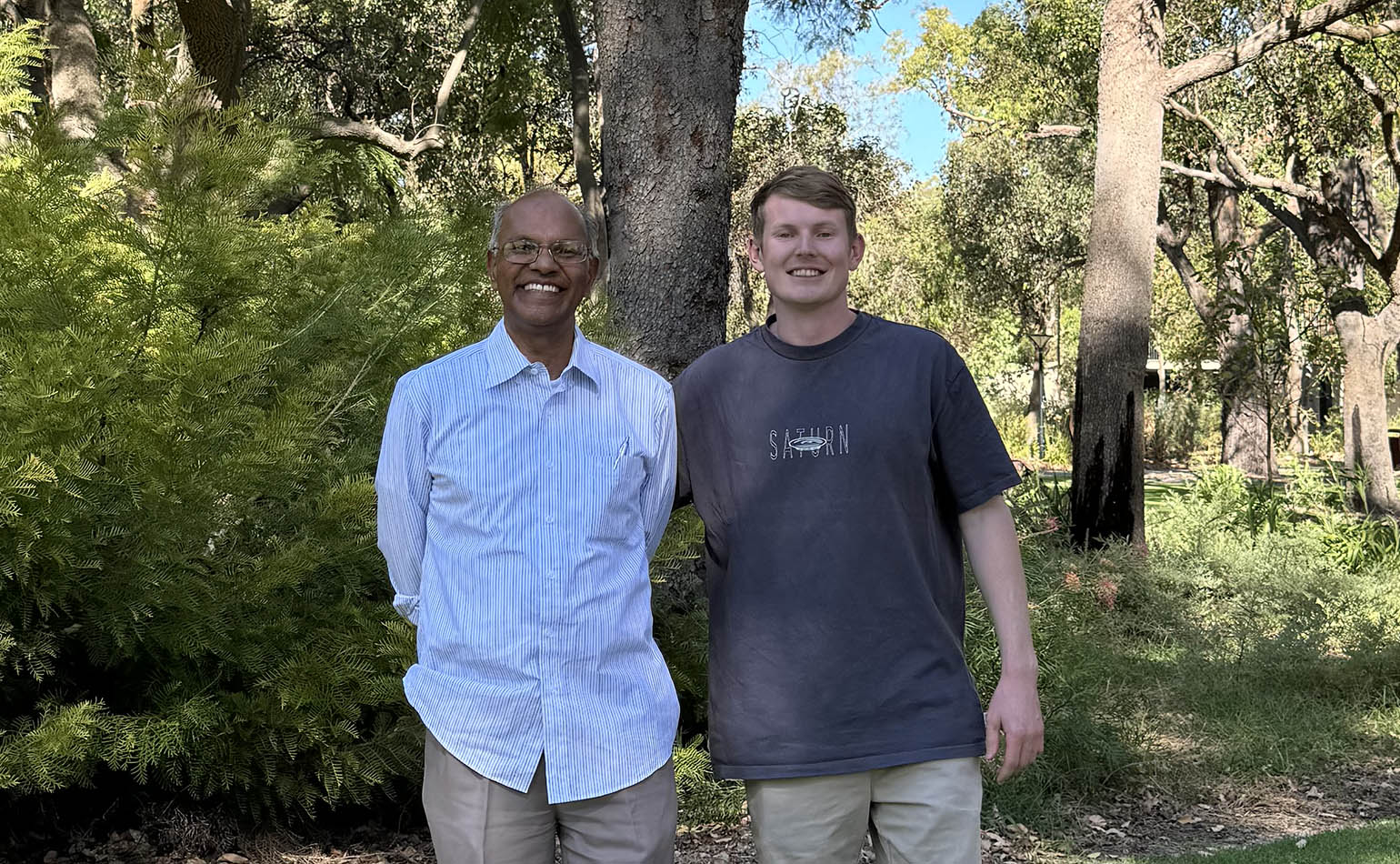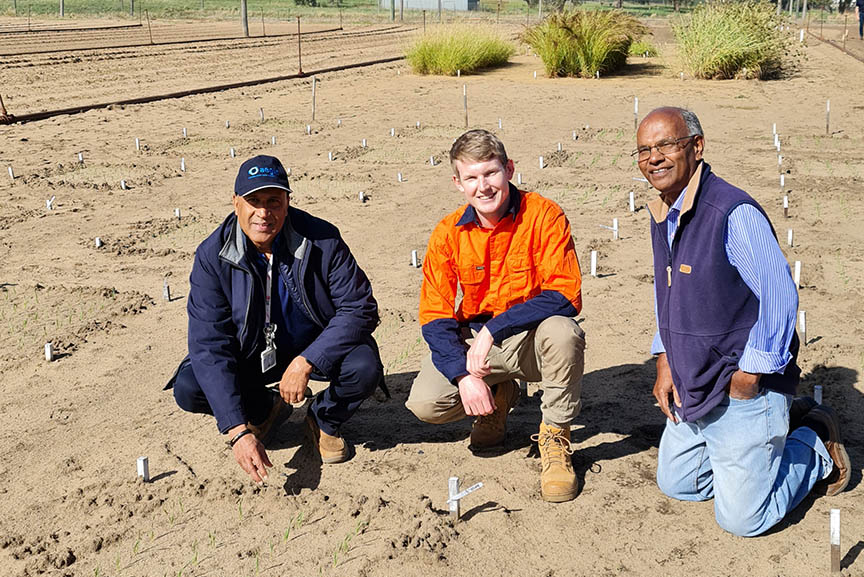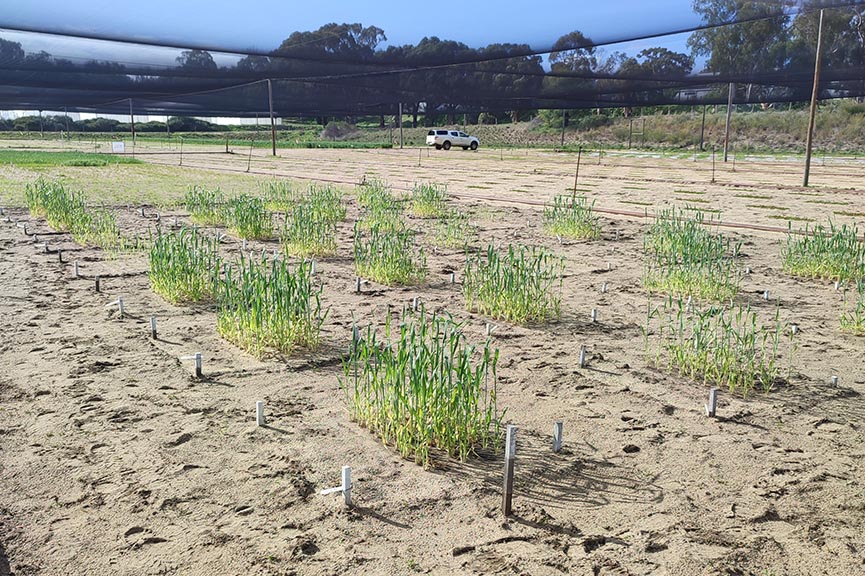With a fierce curiosity and a passion for science, it’s not surprising that Novocastrian James O’Connor is on the verge of completing his PhD with the Soil CRC and University of Western Australia.
“Even as a child I was curious about the most efficient way to grow a plant,” James said. “I’ve always been interested in science, and agriculture encompasses a broad spectrum of scientific disciplines.”
James’ PhD journey began at the University of Newcastle, studying Environmental Science and Management with a major in Earth Systems. It was during his second year at university that James met Professor Nanthi Bolan, who he credits for piquing his interest in soil science.
“This area of research greatly intrigued me due to its global impact and critical importance here in Australia,” he said. “I’m inspired by the potential of soil science to create a sustainable future that increases our quality of life.”
James went on to accept an internship with Professor Bolan, which enabled him to focus on the specialty he found most critical: the sustainable recovery of nutrients from food waste to optimise plant growth.
“My undergraduate Honours thesis investigated the use of dehydrated food waste fertiliser products to increase soil health and crop productivity,” he said.
“I’ve always wanted to know how to optimise the growth of a crop while increasing the health of soils, especially in degraded soils. So, it was a natural progression to undertake a PhD in this research area.”
James’ PhD explored solutions to recover vital nutrients from food waste to create sustainable fertilisers for agriculture. He compared various food waste valorisation products, such as compost, anaerobic digestate and acidified digestate, to determine their agronomic value.
“I evaluated the different products as a nutrient source and carbon amendment to improve soil health, soil carbon content, soil fertility and crop productivity,” James explained.
“My research involved the enhancement of liquid digestate through acidification (to retain ammonium – an essential nutrient) and evaporation (to make it easier to handle).
“This adoption of post-processing has the potential to reduce costs at anaerobic digestion facilities, as it increases the value of food waste digestate considerably. Moreover, it can reduce transport costs as it is a nutrient dense fertiliser, unlike raw liquid digestate.”
James’ research provides scientific knowledge about the uses of different existing and novel food waste fertilisers. These fertilisers are potentially a cheap nutrient source, which can greatly improve the soil’s agronomic value and reduce the use of chemical fertilisers.
“I’ve really enjoyed working on a real-world challenge that has the potential to advance society and contribute to a sustainable future,” he enthused.
“I also love being part of the soil science community. I’ve truly appreciated the support of my supervisors, the Soil CRC and University of Western Australia staff and coworkers – they have been amazing.”
“Professor Nanthi Bolan, my principal supervisor, has been exceptional throughout my studies, and I am forever grateful for his support, knowledge, and guidance,” James said.
When asked what he is most proud of, James continued to highlight the human aspects of his PhD experience. “I’m proud of the positive and productive relationships I’ve developed with my supervisors, coworkers and industry – working together to benefit science as a whole has been a true privilege.”
Outside of his research, it’s also the people and relationships he values most, whether it’s joining teammates for a game of touch footy or watching the Newcastle Knights with family and friends.
James should also be proud of submitting his thesis last month, achieving his goal to submit within an impressive three years of his candidature. He is now set to embark on a new challenge as a postdoctoral fellow at the University of Western Australia, where he’ll complete a meta-analysis of the impact of biochar on crop productivity in tropical soils.
“After that, I aim to work in an industry or research institute that focuses on sustainability in the agriculture or waste management sector,” he said. “I also have interests in technology that will advance agriculture, such as automated hydroponic systems.”
We look forward to hearing where James’ next adventure takes him.
Find out more
Read James’ publications:
- O’Connor, J., Mickan, B.S., Gurung, S.K., Bühlmann, C.H., Jenkins, S.N., Siddique, K.H.M., Leopold, M. & Bolan, N.S. (2024). Value of food waste-derived fertilisers on soil chemistry, microbial function and crop productivity. Applied Soil Ecology 198, 105380. https://doi.org/10.1016/j.apsoil.2024.105380
- O’Connor, J., Mickan, B.S., Yusiharni, E., Singh, G., Gurung, S.K., Siddique, K.H.M., Leopold, M. & Bolan, N.S. (2024). Characterisation and agronomic evaluation of acidified food waste anaerobic digestate products. Journal of Environmental Management 355, 120565. https://doi.org/10.1016/j.jenvman.2024.120565
- O’Connor, J. (2023). Waste product repurposed as innovative fertiliser. University of Western Australia Newsletter, 50, September 2023.
- O’Connor, J., Mickan, B.S., Gurung, S.K., Siddique, K.H.M., Leopold, M. & Bolan, N.S. (2023). Enhancing nutrient recovery from food waste anaerobic digestate. Bioresource Technology 390, 129869. https://doi.org/10.1016/j.biortech.2023.129869
- O’Connor, J., Mickan, B.S., Siddique, K.H.M., Rinklebe, J., Kirkham, M.B. & Bolan, N.S. (2022). Physical, chemical, and microbial contaminants in food waste management for soil application: A review. Environmental Pollution 300, 118860. https://doi.org/10.1016/j.envpol.2022.118860
- O’Connor, J., Mickan, B.S., Rinklebe, J., Song, H., Siddique, K.H.M., Wang, H., Kirkham, M.B. & Bolan, N.S. (2022). Environmental implications, potential value, and future of food-waste anaerobic digestate management: A review. Journal of Environmental Management 318, 115519. https://doi.org/10.1016/j.jenvman.2022.115519



